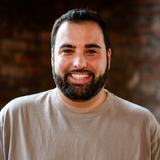Doughnut Economics 🍩 (Spam Mail #11)
Unique synthesizers, anxiety demo, luck, and Spotify vs. Bandcamp
Hi there,
I love doughnuts, so doughnut economics really hooked me in. Turns out it’s actually a great idea.
See you next week!
💩 Cool Shit
Midifinity - Input any characters and get a URL with a unique synthesizer to play.
Disco - Get matched with a different Spotify user every week. You get a playlist with their current obsessions, and they get a playlist with yours.
I Miss My Bar - If you miss bars use this site to create the sounds and ambiance.
Anxiety Demo - An interactive story to show you what anxiety feels like.
Seeing Theory - A visual and interactive way to learn about statistics and probability?
Aurélia Studio - A truly inspiring portfolio site.
💎 Word gems
Amsterdam Is Embracing a Radical New Economic Theory to Help Save the Environment. Could It Also Replace Capitalism? (Time / Ciara Nugent)
Doughnut economics, an awesome name and a compelling argument for us to end GDP and live within our means.
Amsterdam’s ambition is to bring all 872,000 residents inside the doughnut, ensuring everyone has access to a good quality of life, but without putting more pressure on the planet than is sustainable. Guided by Raworth’s organization, the Doughnut Economics Action Lab (DEAL), the city is introducing massive infrastructure projects, employment schemes and new policies for government contracts to that end. Meanwhile, some 400 local people and organizations have set up a network called the Amsterdam Doughnut Coalition.
A Tale Of Two Ecosystems: On Bandcamp, Spotify And The Wide-Open Future (NPR / Damon Krukowski)
This is a great piece showing how different product visions can shape entirely different business models.
Bandcamp does stream music – I'm still going to give the same argument to those who tell me it doesn't – but it's so far from the mission of the service, it doesn't even play into Diamond's view of it. Simply put: streaming doesn't support artists. So even though Bandcamp does stream (see, I'm making that argument again!), that's not how it supports artists. Which is what it really is about as a service.
How to be lucky (Psyche / Christian Busch)
This piece shows the power of reframing, and how openness is connected to how lucky we are.
The researchers asked both participants to take separate trips to a coffee shop outside which they’d placed a £5 note on the pavement. Inside, someone posing as a successful businessman sat at the table by the counter. The ‘lucky person’ approached, spotted the money and picked it up. Inside, he ordered a coffee, sat next to the businessman and struck up a conversation with him. The self-described ‘unlucky’ person, on the other hand, failed to notice the money or talk to the businessman. Later, the researchers asked both participants how their day had been. The ‘lucky’ person reported having had a great day – he’d found money in the street, and made a new friend (who might lead him to additional opportunities). Meanwhile, the ‘unlucky’ person described her day as uneventful. So, although both participants had the same chances, only one was able to ‘see’ them.
If you ❤️ what you read share this email with a friend and get 80 Free Spins on Dr. Winmore!

